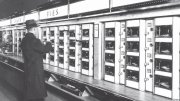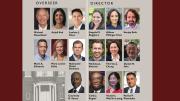In both 1949 and 1950 Harvard won only a single football game; in 1951 Yale won just two. Princeton, however, "had used its alumni to initiate an intensive national gridiron recruiting campaign in the late 1930s, and by the end of 1950 the Tigers ranked seventh in the country," writes John Sayle Watterson, who teaches history at James Madison University, in College Football: History, Spectacle, Controversy (Johns Hopkins University Press, $34.95). Under fire itself from the press and agitated alumni, Harvard in 1951 fired its athletic director since 1928, the rigidly moralistic and outspoken William J. Bingham '16, as Watterson explains.
Bingham lost his job following a poor football season, but Harvard's gridiron decline, which had begun in the early 1930s, made Bingham an easy target. One sportswriter for the Boston Globe attacked Bingham for scheduling tougher opponents than the team could handle, failing to encourage bright football players to enter Harvard, and ignoring the players once they reached Cambridge. Another columnist for the Boston American taunted Harvard in 1950 for hewing to "blue-nose puritanism" and failing to go after big-time football players. "Harvard has steadily lost its customer trade to mail order institutions," he declared, "who fan the schoolboy bushes for big hairy barbarians and sell them back to the public at top prices." The columnist counseled [President James B.] Conant to skim off the top of Harvard's athletic endowment and tell Bingham to buy the "best schoolboy bulls" by ordering the alumni clubs to beat the bushes for football talent.
While Harvard itself did not tie Bingham's demise to the sorry state of its football, his firing strongly suggests that Harvard needed a sacrificial lamb. In the early 1950s the Big Three still had to worry not only about journalists but also about alumni and boosters who wanted to use aggressive recruiting and subsidies to revive Ivy League football. Some of the well-organized alumni of the Big Three institutions recruited and even sponsored informal practice sessions after spring practice had been outlawed....In 1951 Conant passed along to [Yale president A. Whitney] Griswold a call to arms by alumni who wanted to follow the example of Princeton. The letter had gone out to Harvard alumni asking, "Are we mice or men?" The alumni had a duty, the writer argued, to recruit "the right type of boys for Harvard" and further declared that "there are too many over-stimulated introverts and pinkish weaklings and too few good football players and all around he-men."





